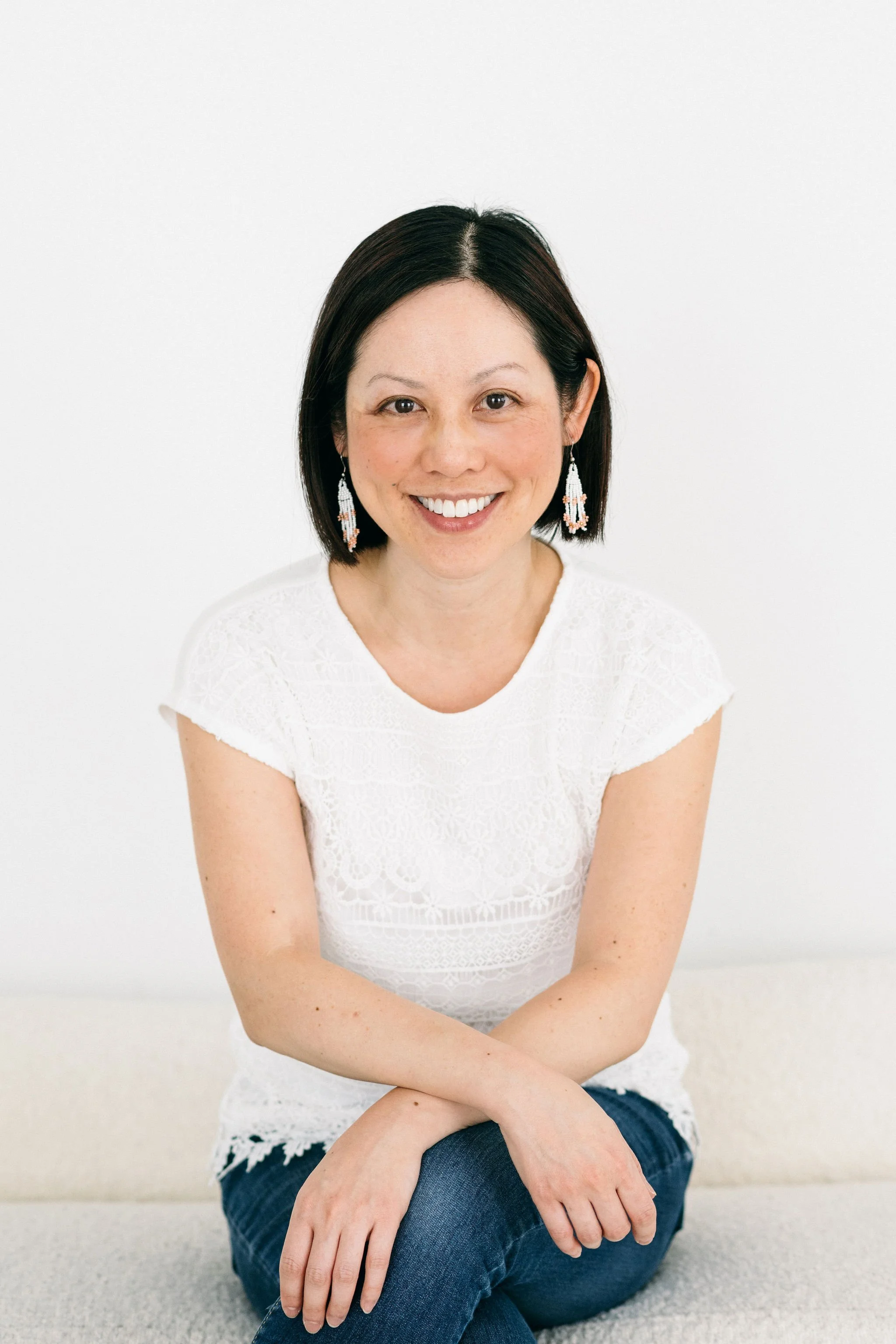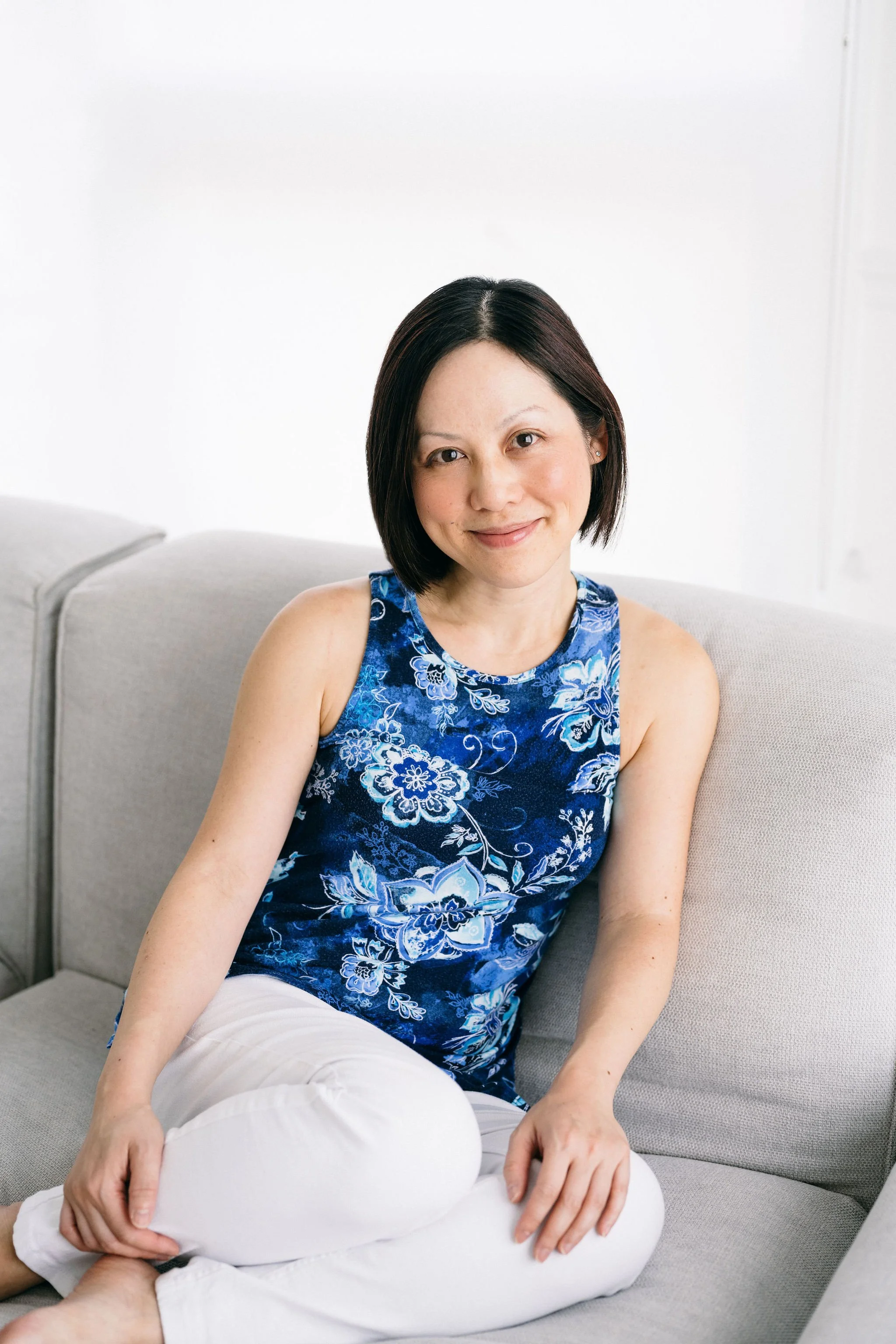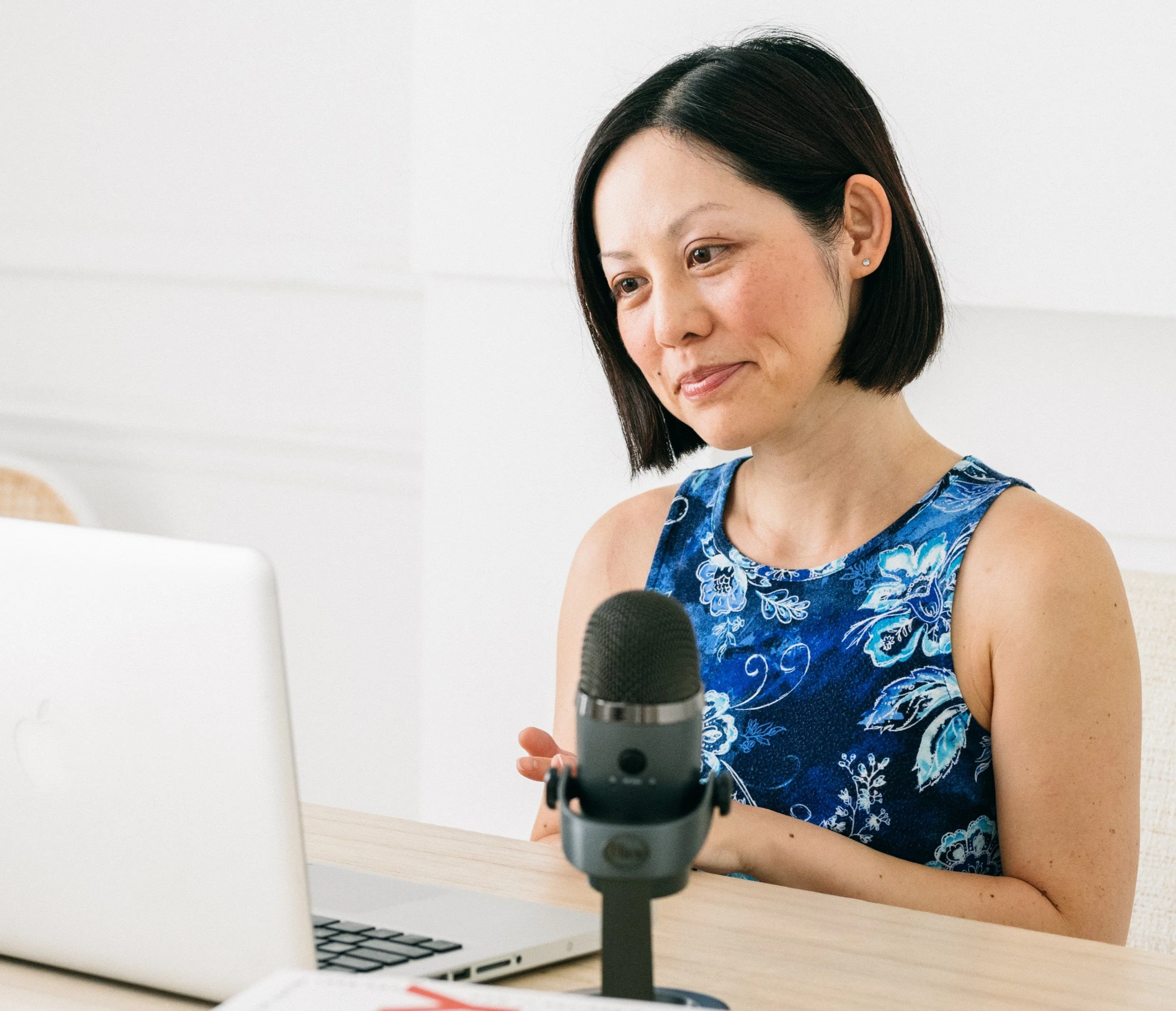
From Traumatized Executive to Trauma-Informed Coach
I’m Rosie, an Asian-Canadian, immigrant, cis-het woman with invisible disabilities – and I have a confession: I never wanted to be a coach.
That may be strange to hear from a coach, and that’s kinda my point: I’m no longer trying to meet “normal” expectations.
I’m proudly living my “new normal.” Now I help people like us find freedom, peace, and self-worth on our own terms.
My Journey Was Long and Difficult
For 20+ years, I lived the “model minority” life – getting the grades, making parents proud, building my resume, climbing the corporate ladder.
But no matter how confident and successful I appeared externally, internally, I felt unfulfilled, depressed and unworthy. My depression, anxiety, and chronic pain were medicalized by Western healthcare, diminished by racism and misogyny, and ignored by capitalism and colonization.
I was working while traumatized, and I was traumatized while working.
Only after I began studying trauma and social justice did I learn how everything intersected to impact my work, my relationships and my health – i.e. my whole life and who I am.
Learning about trauma helped me heal from mine, and I vowed to do what I could to help other women find freedom and healing too.
That’s how I went from Chartered Professional Accountant and Certified Human Resources Leader to Certified Trauma Recovery Coach.
My Calling, Vision, and Mission
If you couldn’t already tell, I don’t fit the Western mold of a traditional corporate executive.
And since you’re reading this, I’m willing to bet you don’t, either!
I started Changing Lenses to serve people like you and me who are:
In-between cultures: too Western for our families, too Asian for Western society
In-between characteristics: too quiet to be assertive, too assertive to be “nice”
In-between circumstances: too stressed to be happy, but not suffering enough to receive sympathy
If you resonate with all that, maybe you too feel simultaneously too much and not enough.
Being intersectional means we’re not one thing or another – we’re many things all at once.
My Coaching Approach, Philosophy and Values
Just like you and me, Un-Executive Coaching™ doesn’t fit any (white) man-made box.
I have training in these therapeutic approaches and research-based modalities, which I mix-and-match to fit your unique intersections:
Somatic experiencing and regulation
Parts work and Internal Family Systems
Motivational Interviewing
Dialectical Behavioural Therapy
Compassionate Inquiry
Polyvagal Theory
General Coaching Principles and Practices
With my Un-Executive approach, you’re not a problem to be fixed – you’re perfectly normal and your behaviour makes sense! I help you heal and grow into who you really are, not who they want you to be.
My Commitment to You: Agency, Voice, and Choice
People with a history of trauma and marginalization have chronically been disempowered and dis-abled. As your coach, I vow to uphold your agency, voice and choice.
That means:
You are in control of your coaching
Nothing is mandatory (including “homework”)
Exercises and experiments happen only with your permission
You can stop at any time, and you can continue whenever you want
You make sense – everything you do is for a good reason and intended to help you (even the stuff that ends up hurting you)
Foundational to my approach are Linda Thai’s principles of psychology, which I learned from her Somatic training programs:
Traditional psychology asks: What’s wrong with you?
Trauma-informed psychology asks: What happened to you?
Culturally-informed psychology asks: What happened to your people?
Liberation psychology asks: What continues to happen to you and your people?
My Professional Experience, Credentials, and Ethics
Before I began coaching full-time, I coached and mentored individuals and teams as a people leader and in internal HR roles. I worked in for-profit and not-for-profit companies as small as 10 people and as big as 3,500 people. I started in corporate as a co-op student auditor and ended as an executive finance leader. You can see my “resume” of work experience and post-graduate education on my LinkedIn profile page.
I’m professionally certified as a Chartered Professional Accountant; a Certified Human Resources Leader; and a Certified Trauma Recovery Coach. This means I’m held to a high standard of professional standards and ethical behaviour which govern my services and coaching relationships. If I violate any of these standards, or if I fail their annual renewal requirements, my certification will be revoked.
If you’d like more info on my professional requirements, you can access the full standards and policies for each of my designations below.
-
Chartered Professional Accountants of Ontario (CPA Ontario)’s Code of Professional Conduct
Human Resources Professionals Association (HRPA)’s Code of Ethics and Rules of Professional Conduct
International Association of Trauma Recovery Coaching (IAOTRC)’s Guiding Principles and Code of Ethics
You can verify my certification status for these three organizations by searching for my name (Rosie Yeung) in their active member directories:
In addition to my professional certifications, I’ve studied extensively with leading trauma experts to build my qualifications and protect coachee safety.
My deepest areas of study have been:
The comprehensive impacts of trauma and innovative methods of trauma treatment through Dr. Bessel van der Kolk’s 7-month program in Traumatic Stress Studies
The traumatic impacts of immigration, colonization, and social injustice on our autonomic nervous system and how to treat them somatically in Linda Thai’s 4-month program on Somatic Embodiment and Regulation Strategies
The traumatic impacts of capitalism, racism and social injustice on our mind, body, and spirit and how to treat them in Dr. Gabor Maté’s Compassionate Inquiry short course
You can see my growing list of completed trauma and coaching education below.
-
Certificate Program in Traumatic Stress Studies, taught by Bessel van der Kolk et al from The Trauma Research Foundation
Self-Trust and Integrated Resilience (STAIR) – A Framework for Synthesizing Therapy Level 1: Working Experientially with Clients, taught by Julianne Taylor Shore, LMFT, LPC, SEP
Befriending the Nervous System: Strategies for Trauma, Sensory Processing, and Development Wounds, taught by Linda Thai, LMSW, ERYT-200, CLYL
Somatic Embodiment and Regulation Strategies, taught by Linda Thai, LMSW, ERYT-200, CLYL
Trauma-Informed Motivational Interviewing: A Foundational Approach to Engage and Treat Complex Clients, taught by Kristin Dempsey, EdD, LPCC, LMFT, and Ali Hall, JD
Dialectical Behavior Therapy Certification Training, taught by Lane Pederson, PsyD, LP, C-DBT
Compassionate Inquiry Self-Study Short Course, taught by Gabor Maté, M.D. and Sat Dharam Kaur
Coaching Foundations, taught by various at BetterUp® Coach Development
4 Seasons of Reconciliation, taught by First Nations University
Indigenous Canada, taught by Dr. Tracy Bear et al at the University of Alberta
Inclusion by Design, taught by Dr. Sonia Kang et al at the University of Toronto’s Rotman School of Management
Human Rights, Human Wrongs: Challenging Poverty, Vulnerability and Social Exclusion, taught by Joshua Castellino and Sarah Bradshaw through SDGAcademyX
The Indigenous Circle Approach to Cultural Confidence ™ Course, taught by Shannon Monk Payne at Sakatay Global
Justice Today: Money, Markets, and Morals, taught by Michael J. Sandel through HarvardX
Not My Professional Experience (aka What I Don’t Do)
Part of my ethical commitment to you is to maintain my professional knowledge, and also to be clear about what I don’t offer or do.
I’m not a licensed psychotherapist, psychologist, or other medical professional. I do not provide therapy, prescribe medication, or make diagnoses (mental or otherwise). My services are not a substitute for professional therapy, medical treatment, or crisis care.
Participation in my services does not establish a legally protected therapist-client, doctor-patient, or any other professional healthcare relationship. Nothing on my website, in my programs, or in any associated Changing Lenses materials, including but not limited to worksheets, digital content, or live sessions, constitutes or should be construed as medical, psychological, or psychiatric advice.
My services and website content is not a replacement for, nor supersedes, the direction of your medical or mental health provider. Furthermore, nothing within my content or services constitutes a diagnosis, treatment plan, medical recommendation, or specific therapeutic intervention.
You can review the full service terms and conditions and privacy policy in the footer.
My Location and Land Acknowledgment
I was both colonized and colonizer. I was born in a British colony and I immigrated to Turtle Island, a land that was colonized by white Europeans for hundreds of years. Today, I live and work in what is colonially named Toronto (Tkaronto), Canada, on land that is the rightful home of many nations indigenous to Turtle Island, including the Anishinaabe, the Huron-Wendat, the Haudenosaunee Confederacy, and the Mississaugas of the Credit.
Turtle Island is the home of many diverse First Nations, Inuit and Métis people. Some of their ancestral lands were taken from them through colonial treaties; some were just taken. The process of treaty negotiation and signing, presented by colonizers as honourable and legal, was often manipulated by fraud and coercion.
My commitment to decolonization involves unlearning internalized beliefs and practices that are oppressive and harmful to all colonized peoples, and to walking the path of Truth and Reconciliation, including the 94 Calls to Action.






